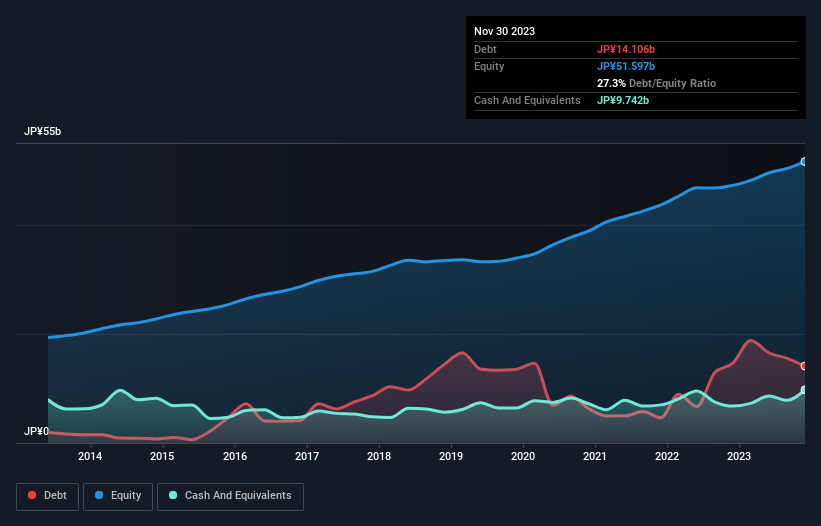- Japan
- /
- Food and Staples Retail
- /
- TSE:2791
These 4 Measures Indicate That DaikokutenbussanLtd (TSE:2791) Is Using Debt Reasonably Well
Some say volatility, rather than debt, is the best way to think about risk as an investor, but Warren Buffett famously said that 'Volatility is far from synonymous with risk.' When we think about how risky a company is, we always like to look at its use of debt, since debt overload can lead to ruin. We note that Daikokutenbussan Co.,Ltd. (TSE:2791) does have debt on its balance sheet. But should shareholders be worried about its use of debt?
When Is Debt A Problem?
Debt and other liabilities become risky for a business when it cannot easily fulfill those obligations, either with free cash flow or by raising capital at an attractive price. Part and parcel of capitalism is the process of 'creative destruction' where failed businesses are mercilessly liquidated by their bankers. While that is not too common, we often do see indebted companies permanently diluting shareholders because lenders force them to raise capital at a distressed price. Of course, plenty of companies use debt to fund growth, without any negative consequences. The first step when considering a company's debt levels is to consider its cash and debt together.
Check out our latest analysis for DaikokutenbussanLtd
What Is DaikokutenbussanLtd's Net Debt?
As you can see below, DaikokutenbussanLtd had JP¥14.1b of debt, at November 2023, which is about the same as the year before. You can click the chart for greater detail. On the flip side, it has JP¥9.74b in cash leading to net debt of about JP¥4.36b.

How Strong Is DaikokutenbussanLtd's Balance Sheet?
We can see from the most recent balance sheet that DaikokutenbussanLtd had liabilities of JP¥31.2b falling due within a year, and liabilities of JP¥14.9b due beyond that. Offsetting these obligations, it had cash of JP¥9.74b as well as receivables valued at -JP¥75.0m due within 12 months. So its liabilities outweigh the sum of its cash and (near-term) receivables by JP¥36.4b.
While this might seem like a lot, it is not so bad since DaikokutenbussanLtd has a market capitalization of JP¥129.3b, and so it could probably strengthen its balance sheet by raising capital if it needed to. But it's clear that we should definitely closely examine whether it can manage its debt without dilution.
In order to size up a company's debt relative to its earnings, we calculate its net debt divided by its earnings before interest, tax, depreciation, and amortization (EBITDA) and its earnings before interest and tax (EBIT) divided by its interest expense (its interest cover). Thus we consider debt relative to earnings both with and without depreciation and amortization expenses.
DaikokutenbussanLtd has a low debt to EBITDA ratio of only 0.30. And remarkably, despite having net debt, it actually received more in interest over the last twelve months than it had to pay. So it's fair to say it can handle debt like a hotshot teppanyaki chef handles cooking. Also positive, DaikokutenbussanLtd grew its EBIT by 26% in the last year, and that should make it easier to pay down debt, going forward. The balance sheet is clearly the area to focus on when you are analysing debt. But ultimately the future profitability of the business will decide if DaikokutenbussanLtd can strengthen its balance sheet over time. So if you're focused on the future you can check out this free report showing analyst profit forecasts.
But our final consideration is also important, because a company cannot pay debt with paper profits; it needs cold hard cash. So it's worth checking how much of that EBIT is backed by free cash flow. Considering the last three years, DaikokutenbussanLtd actually recorded a cash outflow, overall. Debt is far more risky for companies with unreliable free cash flow, so shareholders should be hoping that the past expenditure will produce free cash flow in the future.
Our View
DaikokutenbussanLtd's interest cover was a real positive on this analysis, as was its EBIT growth rate. But truth be told its conversion of EBIT to free cash flow had us nibbling our nails. When we consider all the elements mentioned above, it seems to us that DaikokutenbussanLtd is managing its debt quite well. Having said that, the load is sufficiently heavy that we would recommend any shareholders keep a close eye on it. Above most other metrics, we think its important to track how fast earnings per share is growing, if at all. If you've also come to that realization, you're in luck, because today you can view this interactive graph of DaikokutenbussanLtd's earnings per share history for free.
If you're interested in investing in businesses that can grow profits without the burden of debt, then check out this free list of growing businesses that have net cash on the balance sheet.
New: Manage All Your Stock Portfolios in One Place
We've created the ultimate portfolio companion for stock investors, and it's free.
• Connect an unlimited number of Portfolios and see your total in one currency
• Be alerted to new Warning Signs or Risks via email or mobile
• Track the Fair Value of your stocks
Have feedback on this article? Concerned about the content? Get in touch with us directly. Alternatively, email editorial-team (at) simplywallst.com.
This article by Simply Wall St is general in nature. We provide commentary based on historical data and analyst forecasts only using an unbiased methodology and our articles are not intended to be financial advice. It does not constitute a recommendation to buy or sell any stock, and does not take account of your objectives, or your financial situation. We aim to bring you long-term focused analysis driven by fundamental data. Note that our analysis may not factor in the latest price-sensitive company announcements or qualitative material. Simply Wall St has no position in any stocks mentioned.
About TSE:2791
Adequate balance sheet with moderate growth potential.
Market Insights
Community Narratives



